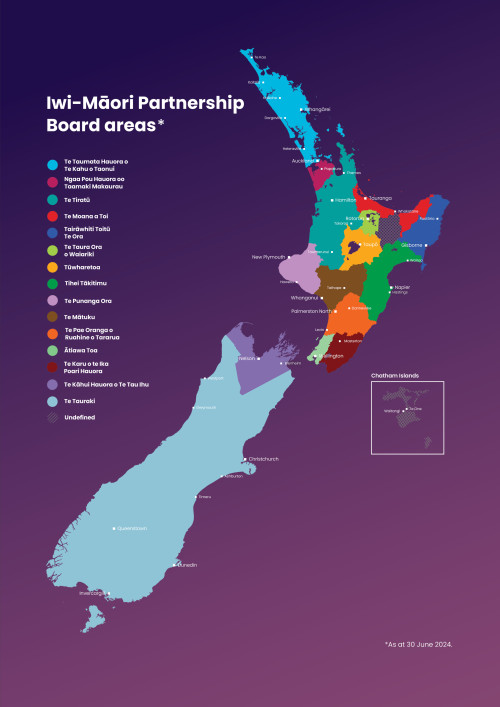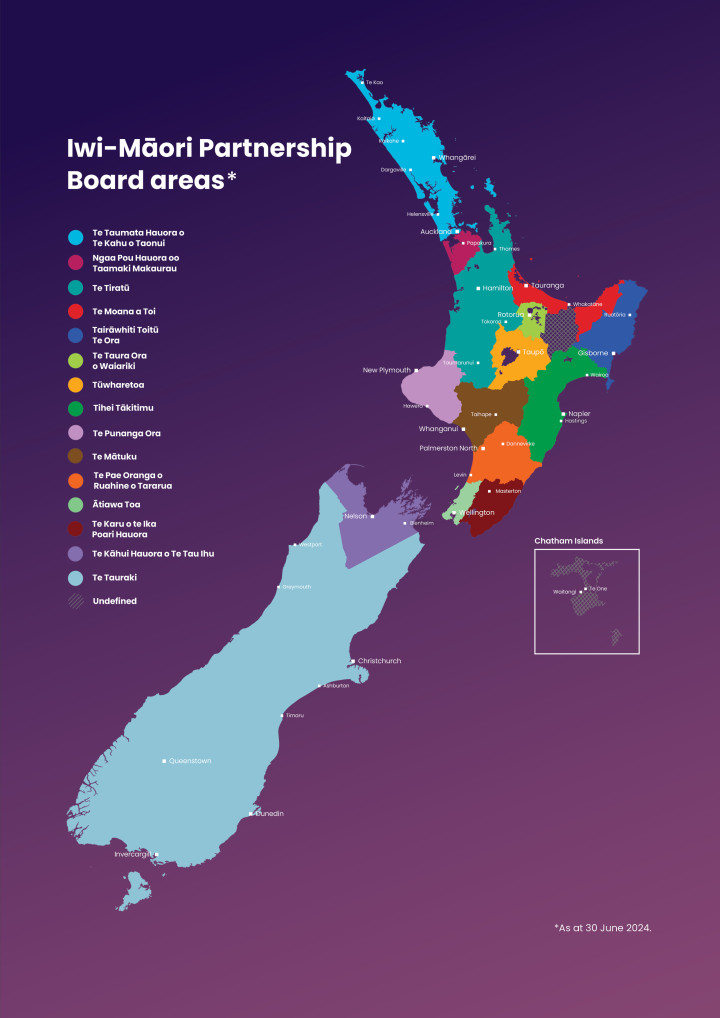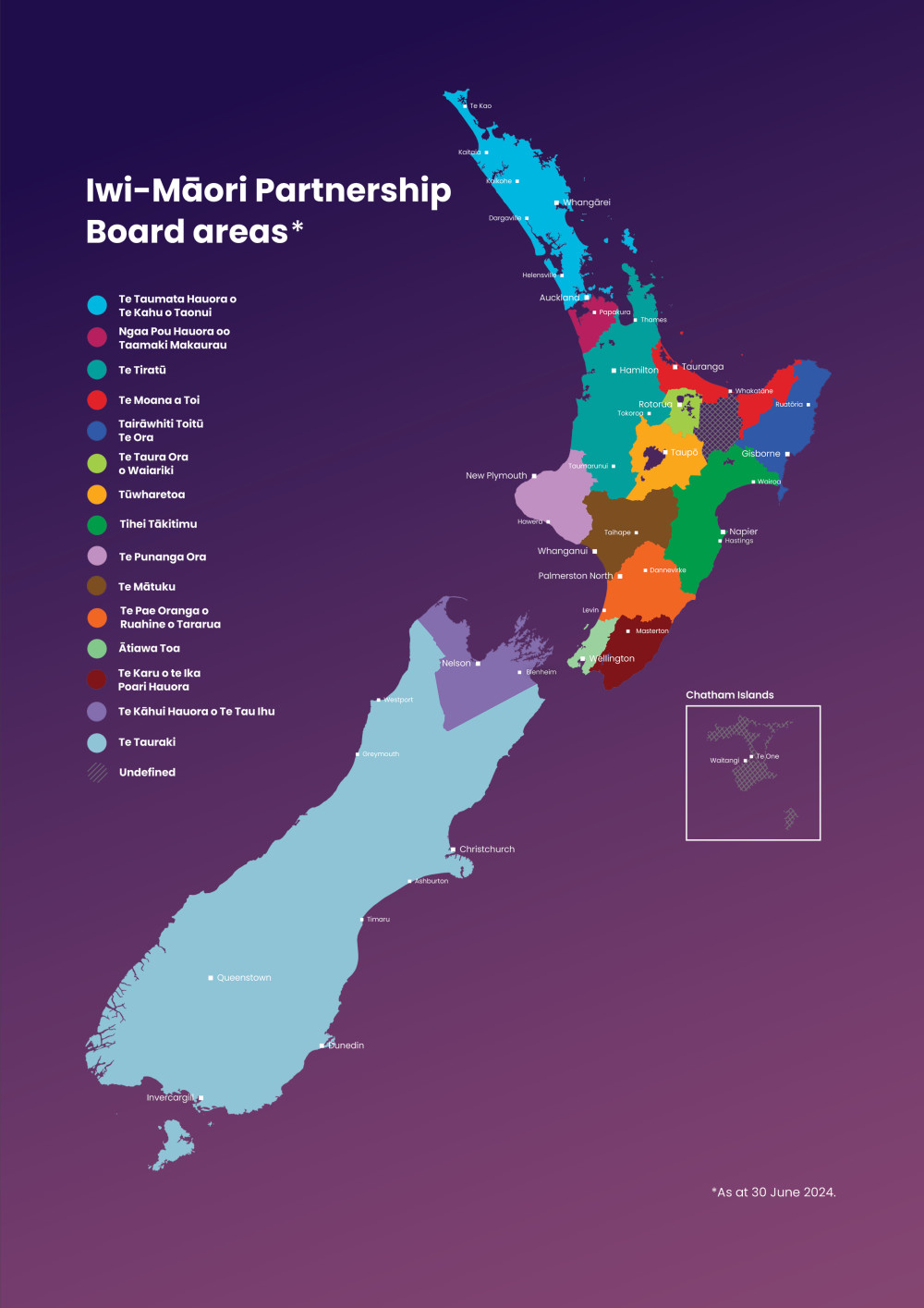On this page
Iwi Māori Partnership Board areas



Iwi Māori Partnership Board areas - as at 30 June 2024
Iwi Māori Partnership Board areas - as at 30 June 2024
About the Iwi Māori Partnership boards
The Iwi Māori partnership boards (IMPBs) were established under legislation in 2022. They play a crucial role in advancing their tino rangatiratanga aspirations that ensure the health needs and priorities of Māori communities are met.
As outlined in the Pae Ora (Healthy Futures) Act 2022, IMPBs must engage with communities, assess the state of hauora Māori, monitor health sector performance, work with Health New Zealand │ Te Whatu Ora to develop priorities for improving hauora Māori.
The 15 recognised IMPBs
- Te Taumata Hauora o Te Kahu o Taonui. (external link) Tai Tokerau-Tāmaki (Northland and North, West and Central)
- Ngaa Pou Hauora oo Taamaki Makaurau (external link) South Auckland
- Te Tiratū, (external link) Waikato-Tainui
- Te Moana a Toi, Mataatua (external link) Bay of Plenty
- Tairāwhiti Toitū Te Ora (external link). Tairāwhiti
- Te Taura Ora ō Waiariki, (external link) Te Arawa (Rotorua)
- Tūwharetoa (external link), Tūwharetoa (Taupō)
- Te Punanga Ora. (external link) Taranaki
- Te Mātuku, (external link) Whanganui
- Tihei Tākitimu (external link), Tākitimu (Hawkes Bay)
- Te Pae Oranga o Ruahine o Tararua (external link), Manawatū
- Te Karu o te Ika Poari Hauora (external link), Wairarapa
- Ātiawa Toa (external link), Greater | Te Upoko o te Ika (Wellington, Hutt, Porirua and Kāpiti)
- Te Kāhui Hauora o Te Tau Ihu (external link), (Nelson and Marlborough)
- Te Tauraki (external link), Ngāi Tahu (South Island, except Nelson or Marlborough)
IMPBs strengthen the overall health system to ensure Māori voices are heard in decision-making that affects Māori health. They foster culturally relevant health services, significantly contributing to better health outcomes for Māori.
Roles and responsibilities
IMPBs represent connected communities who are best placed to understand the needs of whānau, hapū and iwi in their respective regions, to a future of pae ora (good health).
They play a crucial role in advancing their tino rangatiratanga aspirations that ensure the health needs and priorities of Māori communities are met. It is the work that happens within their respective regions that will make a difference.
IMPB Health Profiles Volumes 1 and 2
The IMPB Health Profiles Volume One and Two provide each IMPB with the most up to date snapshot of Māori health data specific to each of the 15 IMPBs.
The data in these profiles build on the legacy of Māori-led health data from the Hauora: Māori Standards of Health series to Tatau Kahukura and the 2015 DHB Māori Health Profiles.
Frequently asked questions
What is an Iwi Māori Partnership Board?
What is an Iwi Māori Partnership Board?
- IMPBs represent local needs and aspirations of whānau Māori living in their takiwā.
- They support the delivery of services and public health interventions within their respective rohe.
- IMPBs represent connected communities who are best placed to understand their needs to a future of pae ora.
- Their purpose and functions for can be viewed in the Pae Ora (Healthy Futures) Act 2022 (external link)
How many IMPBs are there?
How many IMPBs are there?
There are currently 15 iwi Māori partnership boards representing iwi from across the country, discussions are in progress to establish two more.
- Te Taumata Hauora o Te Kahu o Taonui, Tai Tokerau & Tāmaki
- Te Moana a Toi, Mataatua
- Ngaa Pou Hauora oo Taamaki Makaurau, South Auckland
- Te Tiratū, Waikato-Tainui
- Tairāwhiti Toitū Te Ora, Tairāwhiti
- Te Taura Ora ō Waiariki, Te Arawa
- Tūwharetoa, Tūwharetoa
- Te Punanga Ora, Taranaki
- Te Mātuku, Whanganui
- Tihei Tākitimu, Tākitimu Hawkes Bay
- Te Pae Oranga o Ruahine o Tararua, Manawatū
- Te Karu o te Ika Poari Hauora, Wairarapa
- Ātiawa Toa, Greater Wellington/Hutt
- Te Kāhui Hauora o Te Tau Ihu, Nelson/Marlborough; and
- Te Tauraki, Ngāi Tahu
Please note: post enactment of the Pae Ora Amendment Bill (external link) on 1 July 2024, Manatū Hauora | Ministry of Health and the Director General of Health are now legislatively responsible for the roles held previously by Te Aka Whai Ora, Māori Health Authority and the Te Aka Whai Ora Board.
What is the process to establishing and recognising an Iwi Māori Partnership Board?
What is the process to establishing and recognising an Iwi Māori Partnership Board?
Fifteen IMPBs have been established through a three-step process that encompasses tikanga and mana motuhake.
Appoint - IMPB members were nominated by local iwi-Māori. Those nominations were then mandated by iwi and mana whenua. Each Board also include representatives from iwi, mātāwaka (local Māori who live in an area they might not whakapapa to), and community members with relevant hauora expertise.
Support – Te Aka Whai Ora supported the development of their constitutional and governance arrangements to comply with the Pae Ora Act.
Approve – The Board of Te Aka Whai Ora considered whether the emerging IMPBs met the criteria in the Pae Ora (Healthy Futures) Act 2022 (external link) and advised the Minister of Health they were satisfied all criteria had been met. The Minister recommends an Order in Council and that recommendation is signed by the Governor General and the IMPBs were formally listed Section 31 Recognition of iwi-Māori partnership Boards (external link)
Please note: post enactment of the Pae Ora Amendment Bill (external link) on 1 July 2024, Manatū Hauora | Ministry of Health and the Director General of Health are now legislatively responsible for the roles held previously by Te Aka Whai Ora, Māori Health Authority and the Te Aka Whai Ora Board.
What will the IMPBs do?
What will the IMPBs do?
The functions of IMPBs are legislatively mandated:
- Engage with whānau and hapū on regional health needs, and communicate the results and insights from that engagement to Health New Zealand
- Evaluate the current state of hauora Māori in their region of responsibility for the purpose of determining priorities for improving hauora Māori
- Work with Health New Zealand in developing priorities for improving hauora Māori
- Report on the hauora Māori activities of Health New Zealand to Māori within the area covered by the iwi-Māori partnership board
They play a key role in working with Health New Zealand to understand the health needs of the communities in their area and will have critical input into local planning.
Who decides membership on each Board?
Who decides membership on each Board?
Iwi and mana whenua appoint/mandate representatives in the manner that is most appropriate for the tikanga in their rohe.
How will the IMPBs make a difference for Māori?
How will the IMPBs make a difference for Māori?
- IMPBs are the most visible and recognised expression of tino rangatiratanga in the new system and reflect Te Tiriti partnership in a practical way.
- They strengthen the overall health system to ensure Māori voices are heard in decision-making that affects Māori health.
What is the role of Health New Zealand?
What is the role of Health New Zealand?
- Health New Zealand has a statutory obligation to engage and support IMPBs
- Health New Zealand has an obligation to engage with IMPBs when determining health priorities for Māori
- Section 15 Health New Zealand must support and engage with iwi-Māori partnership boards (external link)